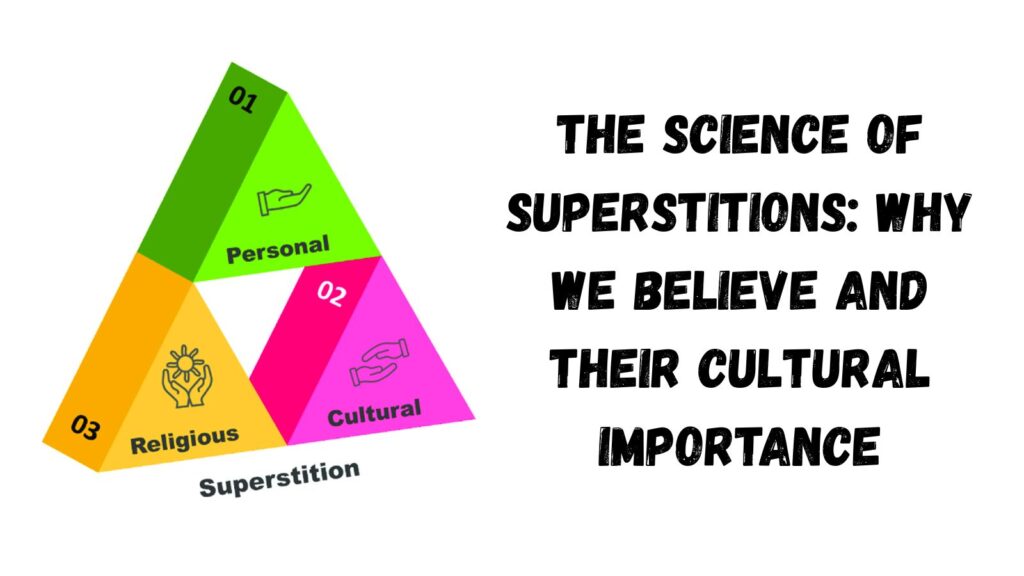The Science of Superstitions: Why We Believe and Their Cultural Importance
Superstitions are everywhere – from crossing your fingers for good luck to avoiding black cats. Even if these old beliefs seem strange or old-fashioned, they still influence how people act in different cultures. Superstitions are everywhere. We knock on wood to avoid bad luck and carry rabbit’s feet for good fortune. They hold a strong place in our minds. But why do we believe in them, even in the age of reason and scientific advancements?
In this blog, we will look at the science of everyday superstitions. We’ll also discuss the psychology behind these beliefs and their cultural importance worldwide. We will share real-life examples and interesting stories. Then, we’ll explore why these customs continue in today’s world.

What Are Superstitions?
Superstitions are beliefs or practices without reason or scientific proof. They often come from a believed connection between an event and what might happen next. These beliefs typically involve supernatural influences or forces that are thought to determine one’s fate. They might carry a lucky charm, do specific rituals, or avoid certain actions. These help them fend off bad luck or invite good fortune.
Example: One of the most common superstitions is the idea that breaking a mirror brings seven years of bad luck. This belief comes from the idea that mirrors reflect your image and your soul. When you break a mirror, it disrupts the link between them.
The Psychology Behind Superstitions
Superstitions have deep psychological roots that trace back to our evolutionary history. Understanding the brain helps us see why we cling to certain beliefs. This happens even when there’s no good reason for them.
1. The Need for Control
One of the main reasons people turn to superstitions is the desire for control over uncertain situations. Humans are naturally inclined to seek patterns and explanations for the unknown. In stressful times, like during a job interview or a big exam, superstitions can make us feel more in control.
Real-Life Example: An athlete might wear the same pair of socks for every game if they win a match while wearing them. People think these socks affect their performance. This belief makes them feel in control of the outcome, even though the socks don’t really change how they play.
2. Cognitive Biases
Our brains are wired to make connections and find patterns, even in random events. This is called “apophenia,” the tendency to perceive meaningful connections between unrelated things. This bias can lead to the formation of superstitions.
Fun Fact: One famous example is the case of a baseball player who hit a home run after wearing a new pair of cleats for the first time. The player attributes the success to the cleats, when in reality, the outcome was due to a variety of factors, including skill and timing.
3. The Confirmation Bias
Confirmation bias is a psychological phenomenon. It leads us to remember things that support our beliefs. We often ignore evidence that goes against them. When a superstition appears to “work”—like a lucky charm bringing good luck—people focus on the success. They often forget times when the charm didn’t help at all.
Cultural Significance of Superstitions Around the World
Superstitions are not only widespread but also vary greatly across cultures. Some beliefs are universal, while others are uniquely tied to specific regions or societies.
1. Western Superstitions
In Western cultures, superstitions are often linked to concepts of luck and misfortune. For example:
- Black Cats: In many parts of the world, black cats are considered omens of bad luck, particularly if they cross your path. However, in some cultures (such as in the UK), black cats are actually believed to bring good luck.
- Knocking on Wood: This superstition is based on the ancient belief that spirits resided in trees. Knocking on wood was thought to invoke protection or keep evil spirits at bay.
Real-Life Example: In the U.S., people often “knock on wood” after saying something good. They do this to avoid jinxing themselves.
2. Eastern Superstitions
In Eastern cultures, superstitions often come from spiritual beliefs. These include Taoism, Confucianism, and Buddhism.
- Lucky Numbers: In China, the number 8 is considered very lucky because it sounds like the word for “wealth” or “prosperity” in Mandarin. Many people try hard to include the number 8 in their lives. For example, they may pay more for phone numbers or license plates that have an 8.
- The Evil Eye: In many parts of the Middle East and South Asia, people believe in the power of the “evil eye” – a malevolent glare that can cause harm. To protect against it, people may wear amulets or charms like the Nazar, a blue-and-white eye-shaped bead.
3. African Superstitions
In African cultures, superstitions hold strong spiritual meaning. They often relate to health, prosperity, and ancestral spirits.
- The Role of Ancestors: Many African societies believe that ancestors guide and protect the living. To honor them, people may perform rituals or avoid certain actions that could bring bad luck or dishonor their ancestors.
Real-Life Example: In parts of West Africa, people believe that certain animals, such as owls or snakes, are messengers of the spirits. Seeing one may be a sign of a pending change in fortune or a warning to take caution.
Fun and Fascinating Stories About Superstitions
Superstitions often come with interesting and sometimes funny stories. Let’s take a look at a few memorable examples:
- The Curse of the Bambino is a famous sports superstition. It haunted the Boston Red Sox for more than 80 years. The curse supposedly began after the Red Sox sold Babe Ruth, one of baseball’s greatest players, to the New York Yankees. The team then went on to experience an 86-year championship drought, fueling the superstition that Ruth’s departure had cursed the Red Sox.
- The Superstition of Friday the 13th Many people avoid making important decisions or starting new projects on Friday the 13th. The fear of this day is so pervasive that it even has a name: “paraskevidekatriaphobia.” Interestingly, this superstition is not universally feared. In some countries, like Italy, Friday the 17th is considered unlucky instead.
- Wishing on a Star A popular superstition across many cultures is the belief that if you see the first star appear in the evening sky, you should make a wish. This simple ritual has been shared for generations. It brings hope and wonder, even without proof that wishes come true.
Why Do Superstitions Persist in Modern Society?
Despite the rise of science and technology, superstitions have remained a part of human culture. Why do they still hold such power?
- Comfort in Uncertainty: Superstitions provide comfort during times of uncertainty. They offer a sense of control in situations where outcomes are unpredictable.
- Cultural Tradition: Many superstitions are rooted in cultural traditions. They are passed down through generations. They carry social and emotional significance beyond their literal meaning.
- Psychological Reward: When a superstition “works,” it makes people feel validated. This boosts their belief in the ritual’s power.
Conclusion
Superstitions might seem strange today, but they still exist. This shows they have strong psychological and cultural roots. They provide comfort, control, and a link to tradition. So, they play a key role in human behavior around the world. Understanding the psychology behind these beliefs shows why superstitions persist across generations and cultures.
Superstitions will likely stay as a quirky comfort in our complex world. After all, who doesn’t enjoy a little good luck charm now and then?
44.1 kHz vs 48 kHz in LMMS: Which Sample Rate Should You Choose for Exporting Your Music?
FAQs About Superstitions
We believe in superstitions. They give us comfort and a sense of control. This is especially true when we face uncertainty or stress. They also stem from cognitive biases like apophenia, where we look for patterns in random events.
The most common superstition is the belief that breaking a mirror brings seven years of bad luck. This superstition has roots in ancient beliefs that mirrors reflect not only our image but our soul.
No, superstitions vary significantly across cultures. Some superstitions are common, like the idea that black cats bring bad luck. Others, like the Chinese belief in the lucky number 8, are unique to specific cultures.
Yes, superstitions can help us feel better. They can reduce anxiety and give us a sense of control. They also boost confidence, especially in high-pressure situations like sports or exams.
Yes, superstitions shape our behavior. They can lead us to perform rituals, avoid specific actions, or make choices based on luck or misfortune beliefs.
This breakdown looks at the science and psychology of superstitions. It shows how these beliefs are part of culture and human behavior. This makes it a thorough guide that ranks well on search engines.






